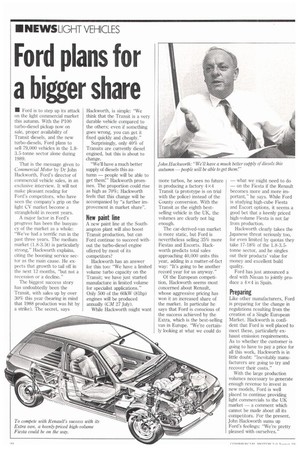Ford plans for a bigger share
Page 24

If you've noticed an error in this article please click here to report it so we can fix it.
• Ford is to step up its attack on the light commercial market this autumn. With the P100 turbo-diesel pickup now on sale, proper availability of Transit diesels, and the new turbo-diesels, Ford plans to sell 79,000 vehicles in the 1.83.5-tonne sector alone during 1989.
That is the message given to Commercial Motor by Dr John Hackworth, Ford's director of commercial vehicle sales, in an exclusive interview. It will not make pleasant reading for Ford's competitors, who have seen the company's grip on the light CV market become a stranglehold in recent years.
A major factor in Ford's progress has been the buoyancy of the market as a whole: "We've had a terrific run in the past three years. The medium market (1.8-3.5t) is particularly strong," Hackworth explains, citing the booming service sector as the main cause. He expects that growth to tail off in the next 12 months, "but not a recession or a decline."
The biggest success story has undoubtedly been the Transit, with sales up by over 30% this year (bearing in mind that 1988 production was hit by a strike). The secret, says Hackworth, is simple: "We think that the Transit is a very durable vehicle compared to the others; even if something goes wrong, you can get it fixed quickly and cheaply."
Surprisingly, only 40% of Transits are currently diesel engined, but this is about to change.
"We'll have a much better supply of diesels this autumn — people will be able to get them!" Hackworth promises. The proportion could rise as high as 70%; Hackworth feels that this change will be accompanied by "a further improvement in market share".
New paint line
A new paint line at the Southampton plant will also boost Transit production, but can Ford continue to succeed without the turbo-diesel engine offered by most of its competitors?
Hackworth has an answer for this too: "We have a limited volume turbo capacity on the Transit; we have just started manufacture in limited volume for specialist applications." Only 500 of the 60kW (81hp) engines will be produced annually (CM 27 July).
While Hackworth might want more turbos, he sees no future in producing a factory 4x4 Transit (a prototype is on trial with the police) instead of the County conversion. With the Transit as the eighth bestselling vehicle in the UK, the volumes are clearly not big enough.
The car-derived-van market is more static, but Ford is nevertheless selling 35% more Fiestas and Escorts. Hackworth predicts total sales approaching 40,000 units this year, adding in a matter-of-fact way: "It's going to be another record year for us anyway."
Of the European competition, Hackworth seems most concerned about Renault, whose aggressive pricing has won it an increased share of the market. In particular he says that Ford is conscious of the success achieved by the Extra, which is the best-selling van in Europe. "We're certainly looking at what we could do — what we might need to do — on the Fiesta if the Renault becomes more and more important," he says. While Ford is studying high-cube Fiesta and Escort options, it seems a good bet that a keenly priced high-volume Fiesta is not far from production.
Hackworth clearly takes the Japanese threat seriously too, for even limited by quotas they take 17-18% of the 1.8-3.5tonne sector, and he singles out their products' value for money and excellent build quality.
Ford has just announced a deal with Nissan to jointly produce a 4x4 in Spain.
Preparing
Like other manufacturers, Ford is preparing for the change in regulations resulting from the creation of a Single European Market. Hackworth is confident that Ford is well placed to meet these, particularly exhaust emission requirements. As to whether the customer is going to have to pay a price for all this work, Hackworth is in little doubt: "Inevitably manufacturers are going to try and recover their costs."
With the large production volumes necessary to generate enough revenue to invest in new models, Ford is well placed to continue providing light commercials to the UK market — a comment which cannot be made about all its competitors. For the present, John Hackworth sums up Ford's feelings: "We're pretty pleased with ourselves."




































































































